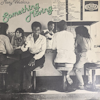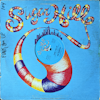Master tapes went missing; hearts were broken. Gloria Ann Taylor’s path of life was one of hard knocks. After a diagnosis with rheumatic fever at the age of ten and the loss of her mother shortly after, it was singing in her church in Toledo, Ohio, that kept her strong. “When Gloria sang, she could make us kids cry with the sad songs she would make up,” remembered her brother (and future collaborator) Leonard in a 2015 feature. That year, Ubiquity Records subsidiary label Luv N’ Haight released Love Is a Hurtin’ Thing, a collection of her raw, psychedelic-tinged deep soul singles released on Selector Sound from 1971 to 1977, giving life to the debut album that never was.
Gloria Ann Taylor first made a name for herself in 1966, performing an Aretha Franklin–styled revue four nights a week in a local Toledo, Ohio, club called the Green Light. Taylor still attended nursing school in case R&B singing didn’t work out. That proved unnecessary after friend and Motown doo-wop singer Prentiss Anderson introduced her to a Detroit producer, Walter “Whiz” Whisenhunt. “He was with James Brown and doing well. He had a big car, fancy clothes, jewelry, and he’d buy me nice things,” recalled Taylor in the record’s copious liner notes. “He kind of had it together.” Whisenhunt’s interest in her music and his business knowledge as a close management associate of James Brown was the professional assurance she needed. They hit it off straight away and began to work on a handful of songs. But there was more to their chemistry. Love blossomed, and the two soon got married.
In 1969, the couple achieved their biggest hit with “You Got to Pay the Price,” for which Whisenhunt slightly smoothed out the instrumental song of the same title by Al Kent to better suit Taylor’s voice. The song gained a Grammy nomination for Best Female R&B Vocal Performance in 1970—won by Taylor’s idol Aretha Franklin for her cover of “Share Your Love with Me” by Bobby “Blue” Bland.
After that success on Shelby Singleton’s Silver Fox label, Whisenhunt and Taylor aspired to start their own imprint. However, the record labels they began, Glo Whiz and Whizenglo (portmanteaus of their nicknames), were short-lived. Even House Guests—a new label endeavor together with Bootsy Collins and his brother Phelps “Catfish” Collins after they left the J.B.’s—didn’t last long. That’s what happens when George Clinton invites you to join Funkadelic, which was the case for the Collins brothers in 1971. But nobody beats the Whiz: in 1972, the private press label Selector Sound was born. The imprint released five 7-inch singles (and the highly sought-after Deep Inside You 12-inch featuring three revisited songs), later compiled in 2015 by Luv N’ Haight on the Love Is a Hurtin’ Thing album.
“Love Is a Hurtin’ Thing” was Sound Selector’s debut single: a string-laden take on a 1966 song by Lou Rawls. Proto-disco hi-hats on the beats lead the way, with a prominent guitar and wah-wah effects. The epic, seven minute long 12-inch version of “Love Is a Hurtin’ Thing” even re-edits the original song with strings, keys, and congas taken from the initial B-side of the single, “How Can You Say It.” The extended version also incorporates new elements, such as a heavy psych guitar intro, more low-end, and an overdubbed kick drum.
The unusual arrangement illustrates how Whisenhunt carved out a specific sound for Gloria. He would push the session musicians to experiment in the studio in long practice sessions before selecting, re-editing, overdubbing, and reusing the best pieces from those recordings. For instance: listening to the B-side to Taylor’s funked-up cover of “Jolene” by Dolly Parton, one might recognize the guitar playing from “Love Is a Hurtin’ Thing” and an alternate vocal line from “How Can You Say It.” Or take the overdubbed drums on “What’s Your World,” which are combined with a wide array of instrumentation and tape sounds.
For the Love Is a Hurtin’ Thing collection, Luv N’ Haight was forced to work without any master tapes. All of them vanished forever when Taylor—after being evicted from her apartment—temporarily stored the Selector Sound master tapes in her son’s car, which got towed away. After years of marital issues and being fed up with the music industry, that moment was it for Taylor. She left Whiz and the biz for good to take care of her three children. Luckily, by meticulously restoring the music from vinyl, cleaning, and remastering, all of the songs originally meant for singles molded into an album-worthy release. As Taylor sang, “the road was rough, and the going got tough,” but for thousands of soul and disco fans, the final destination was worth the journey.


